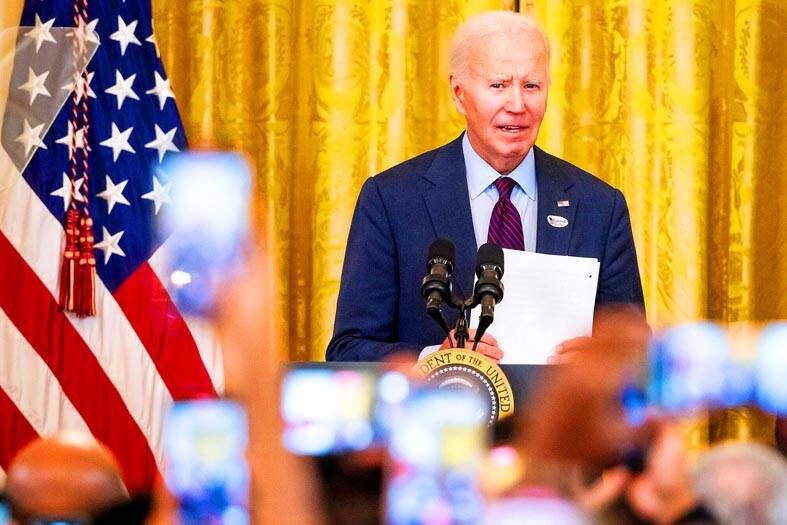US President Joe Biden’s administration is set to initiate a trade investigation into Chinese semiconductors in the coming days as part of a push to reduce reliance on a technology that US officials believe poses national security risks.
The probe could result in tariffs or other measures to restrict imports on older-model semiconductors and the products containing them, including medical devices, vehicles, smartphones and weaponry, people familiar with the matter said.
The investigation examining so-called foundational chips could take months to conclude, meaning that any reaction to the findings would be left to the discretion of US president-elect Donald Trump’s incoming team.

Photo: Bloomberg
Biden officials have for months debated whether to initiate the investigation under Section 301, which allows the US to impose restrictions on countries with unfair trade practices, the people said.
This week, White House officials agreed to move forward with the inquiry that could help protect the US chip industry.
Approving the probe now means that the new Trump administration would likely have the option to impose trade restrictions to protect domestic semiconductor production in the early months of the president-elect’s term.
Bolstering the US semiconductor industry has been a key focus for Biden, who has taken steps to limit advanced US technology from being exported to China.
Biden signed into law a bill that provided billions of dollars of incentives for chipmakers to build semiconductor factories in the US to stave off a need for cheaper Chinese-made chips.
Spokespeople for the US National Security Council and the US trade representative declined to comment.
The White House in the past two years has implemented export restrictions on advanced semiconductors made with US and allied technology, but in the meantime, China has manufactured the older, widely available types of semiconductors at a lower cost than its competitors.
Officials in the Biden administration worry that without restrictions, Beijing would flood the US and global markets with inexpensive chips, undercutting other companies and running them out of business.
In May, the White House announced that by next year it would increase tariffs on Chinese legacy semiconductors to 50 percent from 25 percent.
However, the Biden team largely agreed that was not enough to prevent a market disruption, especially as the US is looking to increase domestic production of semiconductors.
To impose those tariffs, Biden used the same authority Trump employed to levy more than US$300 billion in tariffs on Chinese goods during his first term.

UNCERTAINTY: Innolux activated a stringent supply chain management mechanism, as it did during the COVID-19 pandemic, to ensure optimal inventory levels for customers Flat-panel display makers AUO Corp (友達) and Innolux Corp (群創) yesterday said that about 12 to 20 percent of their display business is at risk of potential US tariffs and that they would relocate production or shipment destinations to mitigate the levies’ effects. US tariffs would have a direct impact of US$200 million on AUO’s revenue, company chairman Paul Peng (彭雙浪) told reporters on the sidelines of the Touch Taiwan trade show in Taipei yesterday. That would make up about 12 percent of the company’s overall revenue. To cope with the tariff uncertainty, AUO plans to allocate its production to manufacturing facilities in

TAKING STOCK: A Taiwanese cookware firm in Vietnam urged customers to assess inventory or place orders early so shipments can reach the US while tariffs are paused Taiwanese businesses in Vietnam are exploring alternatives after the White House imposed a 46 percent import duty on Vietnamese goods, following US President Donald Trump’s announcement of “reciprocal” tariffs on the US’ trading partners. Lo Shih-liang (羅世良), chairman of Brico Industry Co (裕茂工業), a Taiwanese company that manufactures cast iron cookware and stove components in Vietnam, said that more than 40 percent of his business was tied to the US market, describing the constant US policy shifts as an emotional roller coaster. “I work during the day and stay up all night watching the news. I’ve been following US news until 3am

COLLABORATION: Given Taiwan’s key position in global supply chains, the US firm is discussing strategies with local partners and clients to deal with global uncertainties Advanced Micro Devices Inc (AMD) yesterday said it is meeting with local ecosystem partners, including Taiwan Semiconductor Manufacturing Co (TSMC, 台積電), to discuss strategies, including long-term manufacturing, to navigate uncertainties such as US tariffs, as Taiwan occupies an important position in global supply chains. AMD chief executive officer Lisa Su (蘇姿丰) told reporters that Taiwan is an important part of the chip designer’s ecosystem and she is discussing with partners and customers in Taiwan to forge strong collaborations on different areas during this critical period. AMD has just become the first artificial-intelligence (AI) server chip customer of TSMC to utilize its advanced

Six years ago, LVMH’s billionaire CEO Bernard Arnault and US President Donald Trump cut the blue ribbon on a factory in rural Texas that would make designer handbags for Louis Vuitton, one of the world’s best-known luxury brands. However, since the high-profile opening, the factory has faced a host of problems limiting production, 11 former Louis Vuitton employees said. The site has consistently ranked among the worst-performing for Louis Vuitton globally, “significantly” underperforming other facilities, said three former Louis Vuitton workers and a senior industry source, who cited internal rankings shared with staff. The plant’s problems — which have not